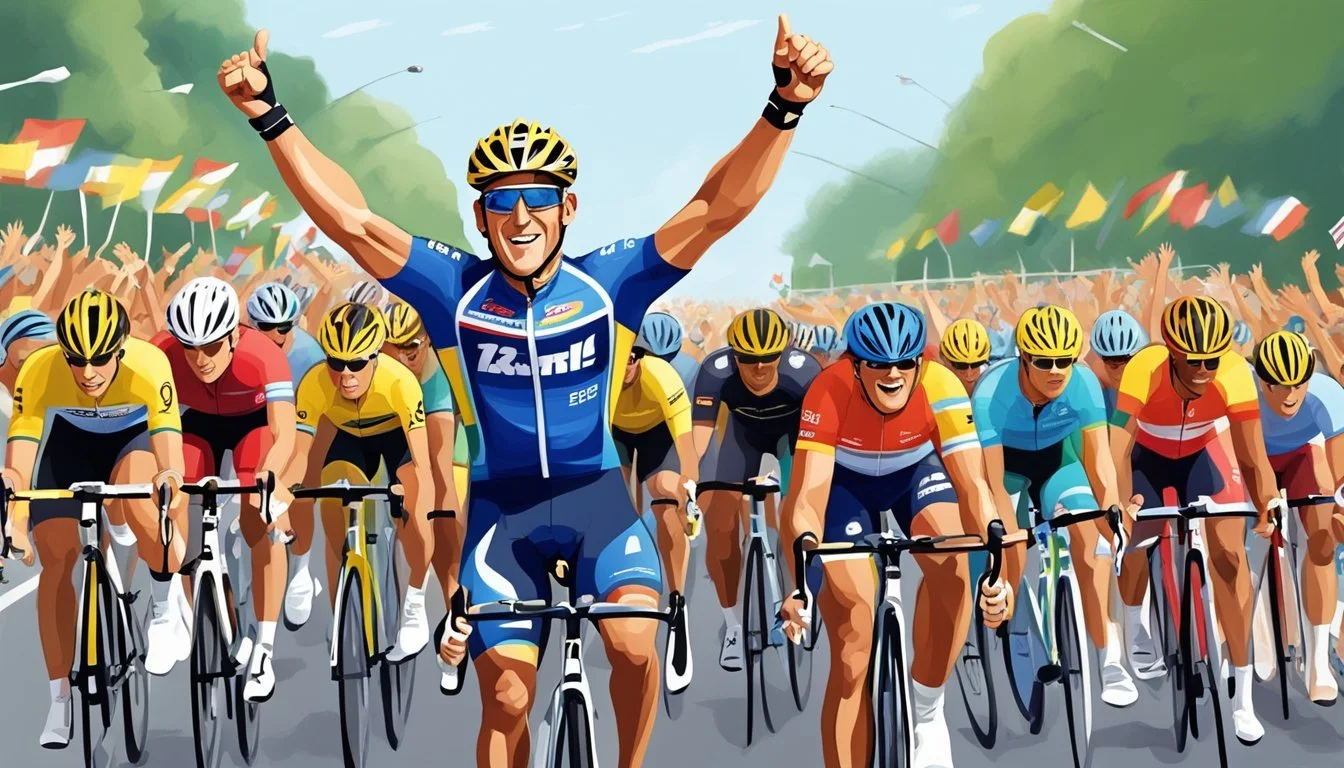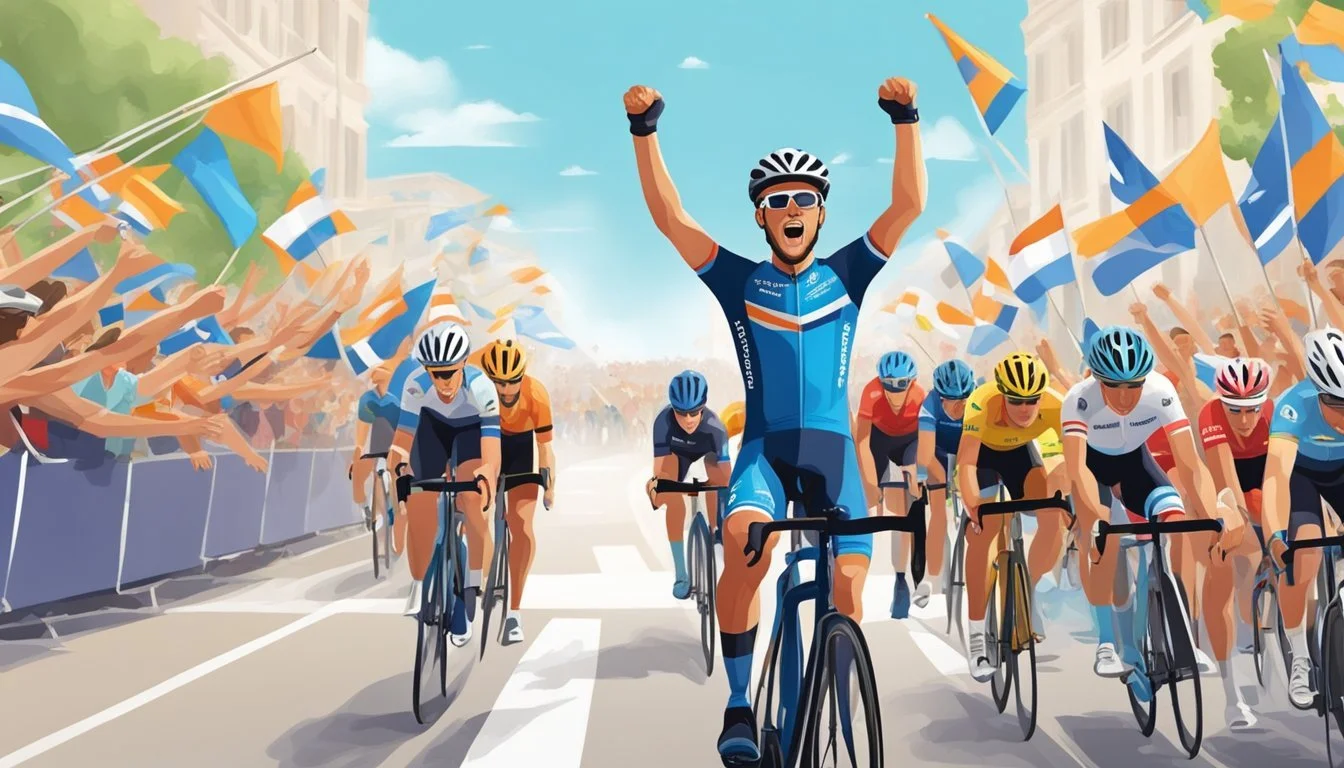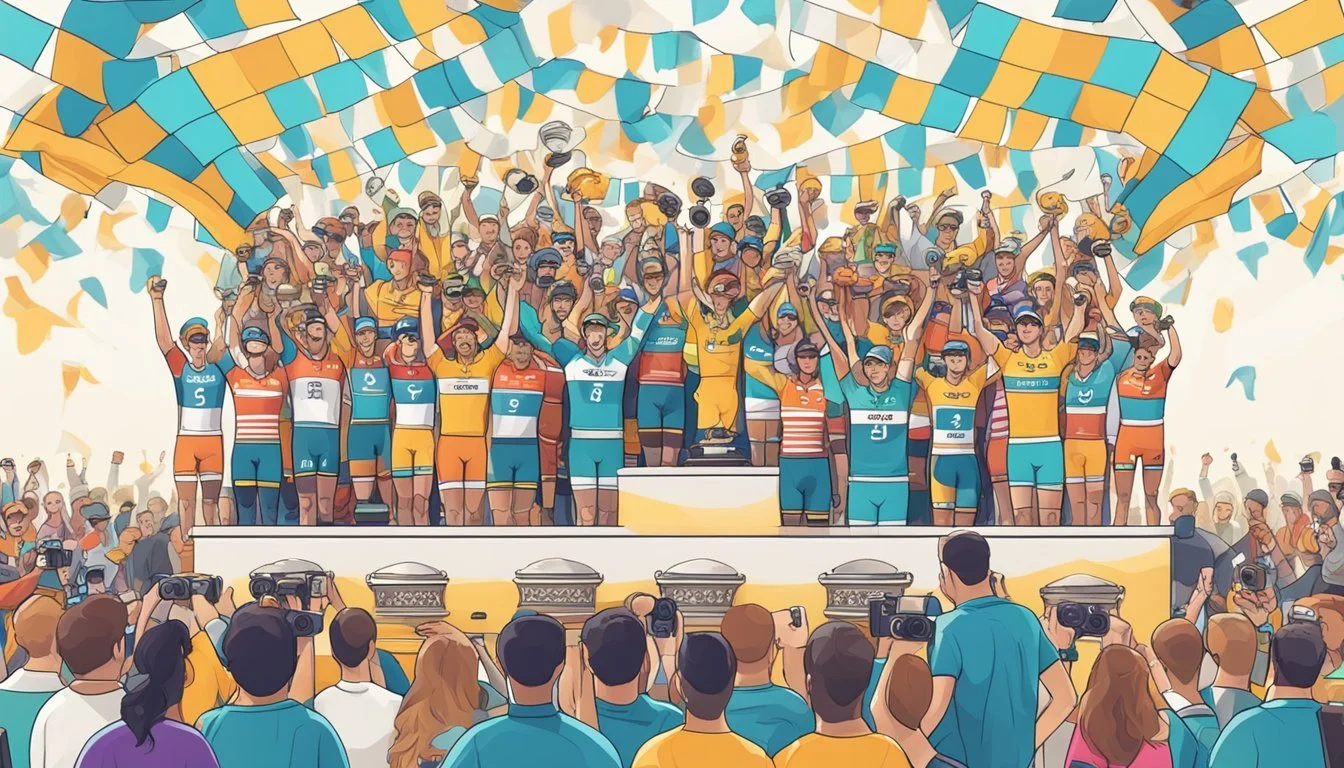Lance Armstrong Tour de France Stage Victories Analyzed
A Detailed Analysis of His Controversial Legacy
Lance Armstrong's Tour de France legacy is inextricably linked to his stage victories. During his career, Armstrong accumulated 22 individual stage wins in cycling's most prestigious race. His dominance was particularly evident in time trials, where he secured 11 of those stage victories.
Armstrong's stage-winning prowess played a crucial role in his unprecedented seven consecutive Tour de France overall victories from 1999 to 2005. These performances captivated cycling fans worldwide and elevated Armstrong to legendary status within the sport.
The American cyclist's ability to excel in both mountain stages and time trials set him apart from his competitors. Armstrong's Tour de France stage wins demonstrated his versatility as a rider and contributed significantly to his long-term success in the race.
Lance Armstrong's Cycling Career
Lance Armstrong's cycling career spanned over two decades, marked by remarkable achievements and later tarnished by doping allegations. His journey from amateur success to Tour de France dominance shaped professional cycling in the late 20th and early 21st centuries.
Early Years and Amateur Success
Armstrong began competitive cycling as a teenager, quickly rising through the ranks. In 1989, he became the U.S. sprint triathlon champion at age 18. His cycling prowess emerged in 1991 when he claimed the U.S. amateur national championship.
Armstrong's talent caught international attention in 1992. He represented the United States at the Barcelona Olympics, securing a 14th place finish in the road race. Later that year, he won his first professional race, the Fitchburg-Longsjo Classic.
Professional Beginnings and Team Affiliations
Armstrong turned professional in 1992, signing with the Motorola team. His early career showed promise with notable victories. In 1993, he won the World Road Race Championship in Oslo, Norway.
He joined Cofidis in 1997 but his tenure was cut short by a testicular cancer diagnosis. After recovery, Armstrong signed with the U.S. Postal Service team in 1998, marking the beginning of his most successful period.
Triumph and Turmoil: The Tour De France Wins and Doping Allegations
From 1999 to 2005, Armstrong dominated the Tour de France, winning an unprecedented seven consecutive titles. His performances were characterized by strong time trials and mountain stage wins.
Armstrong's Tour de France statistics:
Total wins: 7 (later stripped)
Stage wins: 22
Yellow jerseys: 83
However, doping allegations shadowed his success. In 2012, the United States Anti-Doping Agency (USADA) stripped Armstrong of all his titles since 1998, including his Tour de France victories, citing evidence of performance-enhancing drug use.
Comeback Efforts and Final Races
Armstrong initially retired in 2005 but returned to professional cycling in 2009. He competed in the 2009 Tour de France, finishing third overall.
His final Tour de France appearance came in 2010, where he finished 23rd. Armstrong retired from competitive cycling for the second time in 2011.
Post-retirement, Armstrong faced legal battles and admitted to doping in a 2013 interview with Oprah Winfrey. His career ended in controversy, leaving a complex legacy in professional cycling.
Tour de France: A Legendary Race
The Tour de France stands as cycling's most prestigious and grueling event. This iconic race captivates millions worldwide with its challenging stages, fierce competition, and rich history.
Understanding the Tour De France
The Tour de France is a multi-stage bicycle race held annually in France. It typically spans three weeks in July, covering approximately 3,500 kilometers. The race features a variety of terrains, including flat stages, mountain climbs, and time trials.
Riders compete individually and as part of teams. The overall leader wears the coveted yellow jersey, or maillot jaune. Other classifications include the points competition (green jersey), mountains classification (polka dot jersey), and best young rider (white jersey).
The race consists of 21 stages:
Flat stages
Mountain stages
Individual time trials
Team time trials
Noteworthy Stages and Victories
Some stages of the Tour de France have become legendary due to their difficulty or historical significance. The mountain stages in the Alps and Pyrenees often prove decisive in determining the overall winner.
Iconic climbs include:
Alpe d'Huez
Mont Ventoux
Col du Tourmalet
Sprint finishes on the Champs-Élysées in Paris mark the race's final stage. This prestigious stage victory is highly coveted by sprinters.
Individual stage wins are crucial for riders and teams. They provide opportunities for glory and can impact the general classification standings.
Armstrong's Historic Wins
Lance Armstrong dominated the Tour de France from 1999 to 2005, winning seven consecutive titles. His performances in mountain stages and time trials were particularly impressive.
Key aspects of Armstrong's Tour victories:
Strong performances in individual time trials
Dominant climbing in mountain stages
Tactical team support from US Postal Service and Discovery Channel teams
Armstrong's wins brought unprecedented attention to the Tour de France, especially in the United States. However, his titles were later stripped due to doping violations, altering the race's history.
The Battle Against Cancer
Lance Armstrong's journey through cancer profoundly impacted his life and cycling career. His diagnosis, treatment, and recovery became a powerful story of resilience, inspiring millions worldwide.
Diagnosis and Recovery
In October 1996, Armstrong was diagnosed with stage 3 testicular cancer that had spread to his lungs, brain, and abdomen. He underwent surgery to remove a testicle and brain lesions, followed by aggressive chemotherapy. Despite a grim prognosis, Armstrong approached his treatment with the same determination he displayed on the bike.
His recovery was remarkable. By February 1997, Armstrong was declared cancer-free. He returned to cycling training shortly after, defying expectations. This experience transformed him physically and mentally, fueling his drive to excel in the sport.
Livestrong Foundation and Advocate for Cancer Awareness
Armstrong founded the Lance Armstrong Foundation in 1997, later renamed Livestrong. The organization aimed to support cancer patients and survivors, providing resources, education, and advocacy.
The yellow Livestrong wristbands became a global symbol of cancer awareness, raising millions for the cause. Armstrong's high-profile status as a cancer survivor and cycling champion amplified the foundation's impact.
He became a vocal advocate for cancer research and patient rights. Armstrong's story resonated with many, offering hope to those facing similar battles. His efforts helped bring cancer issues to the forefront of public discourse.
Key Figures and Rivalries
Lance Armstrong's Tour de France dominance involved a complex network of teammates, rivals, and support personnel. His victories were shaped by strong alliances and fierce competition.
Teammates and Support System
George Hincapie served as Armstrong's loyal lieutenant, riding alongside him in all seven Tour victories. José Luis Rubiera provided crucial support in the mountains. Levi Leipheimer joined Armstrong's team later, adding strength to the squad.
The U.S. Postal Service team, later Discovery Channel, built a formidable roster around Armstrong. Their "Blue Train" controlled the peloton, protecting their leader and setting a punishing pace.
Armstrong's success also depended on his support staff. Team director Johan Bruyneel developed innovative racing strategies. Mechanics ensured Armstrong's equipment was always in top condition.
Notable Adversaries
Jan Ullrich emerged as Armstrong's chief rival. The German cyclist finished second to Armstrong three times in the Tour de France. Their battles defined an era in cycling.
Ivan Basso challenged Armstrong in the mountains. The Italian climber posed a significant threat, especially in the later years of Armstrong's reign.
Alexandre Vinokourov attacked relentlessly, often disrupting Armstrong's team tactics. His aggressive style made him a constant concern.
Fabian Cancellara and Andreas Klöden also competed against Armstrong, excelling in time trials and stage races respectively. Their performances added depth to the competitive field Armstrong faced.
Doping Scandal and Its Impact
Lance Armstrong's cycling career was marred by a massive doping scandal that shook the sports world. The revelations of systematic cheating led to severe consequences for Armstrong and had far-reaching effects on professional cycling.
Investigations and Sanctions
The United States Anti-Doping Agency (USADA) launched a thorough investigation into Armstrong's alleged doping practices. In 2012, USADA stripped Armstrong of his seven Tour de France titles and banned him from competitive cycling for life. The agency uncovered evidence of a sophisticated doping program involving performance-enhancing drugs and blood transfusions.
Armstrong initially denied the allegations but later admitted to using banned substances throughout his career. The confession came during a televised interview with Oprah Winfrey in 2013, shocking fans and critics alike.
Public Image and Media Relations
Armstrong's reputation took a severe hit following the doping revelations. Once hailed as a cancer survivor and cycling hero, he became a symbol of deception in sports. Media coverage turned highly critical, with many outlets questioning the authenticity of his entire career.
The cyclist lost numerous sponsorships and endorsement deals. His Livestrong Foundation, which raised millions for cancer research, also suffered as Armstrong stepped down from its leadership to protect the organization's reputation.
Effects on Cycling and Armstrong's Legacy
The scandal had profound implications for professional cycling. It exposed the widespread nature of doping in the sport, leading to stricter testing protocols and increased scrutiny of athletes' performances.
Armstrong's legacy in cycling was effectively erased. Record books were rewritten, and his Tour de France victories from 1999 to 2005 now show no official winner. The scandal also cast doubt on the achievements of many of Armstrong's contemporaries.
The affair prompted discussions about ethics in sports and the pressure on athletes to use performance-enhancing drugs. It remains a cautionary tale about the consequences of cheating and the importance of maintaining integrity in competitive athletics.
Statistics and Records
Lance Armstrong's Tour de France career was marked by unprecedented success and later tainted by scandal. His achievements reshaped cycling record books before being stripped due to doping violations.
Tour De France Achievements
Armstrong won 7 consecutive Tour de France titles from 1999 to 2005. He claimed 22 individual stage victories during his career, including 11 time trials. Armstrong wore the yellow jersey for a total of 83 days across his 7 Tour wins.
His most dominant performance came in 2004, when he won 5 individual stages and finished over 6 minutes ahead of his closest rival in the general classification.
Comparison With Cycling Greats
Before his titles were revoked, Armstrong's 7 Tour wins surpassed the previous record of 5 held jointly by Jacques Anquetil, Eddy Merckx, Bernard Hinault, and Miguel Indurain.
Armstrong's 22 stage wins ranked 6th all-time. By comparison, Eddy Merckx won 34 stages and Bernard Hinault 28. In time trials, Armstrong's 11 victories were second only to Merckx's 16.
While Armstrong's official Tour record now shows no wins, his impact on the sport's statistics and record books was immense during his racing career.
Conclusion
Lance Armstrong's Tour de France stage wins remain a complex part of cycling history. His 22 individual stage victories showcased remarkable talent and tactical prowess. Armstrong excelled particularly in time trials, securing 11 wins in this discipline.
The American cyclist's performances captivated audiences worldwide. His aggressive riding style and strategic brilliance led to memorable moments, like the impromptu cyclocross during the 2003 Tour.
Armstrong's achievements extended beyond individual glory. In 2005, he led his team to victory in the Team Time Trial, marking the first such win for an American squad in Tour de France history.
These accomplishments shaped Armstrong's legacy as one of cycling's most dominant figures. His seven consecutive Tour de France titles from 1999 to 2005 set an unprecedented record at the time.
However, subsequent doping revelations altered perceptions of Armstrong's career. The stripping of his Tour titles and stage wins has left a lasting impact on the sport's record books and Armstrong's place in cycling history.




